|
|
|
Sort Order |
|
|
|
Items / Page
|
|
|
|
|
|
|
| Srl | Item |
| 1 |
ID:
138475
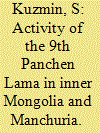

|
|
|
|
|
| Summary/Abstract |
This article describes little-known facts about the activity of the 9th Panchen Lama (1883-1937) after he left Tibet in 1924; in particular, his contacts with Inner Mongolia, Mongolian People's Republic, Manchuria, Japan, and the government of China, on the basis of materials from archives of Russia and Mongolia.
|
|
|
|
|
|
|
|
|
|
|
|
|
|
|
|
| 2 |
ID:
123748
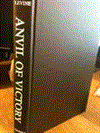

|
|
|
|
|
| Publication |
New York, Columbia University Press, 1987.
|
| Description |
314p.Hbk
|
| Series |
Studies of the East Asian Institute, Columbia University
|
| Standard Number |
0231064365
|
|
|
|
|
|
|
|
|
|
|
|
Copies: C:1/I:0,R:0,Q:0
Circulation
| Accession# | Call# | Current Location | Status | Policy | Location |
| 057443 | 951.8042/LEV 057443 | Main | On Shelf | General | |
|
|
|
|
| 3 |
ID:
031989


|
|
|
|
|
| Publication |
New York, McGraw-Hill Book Company, 1969.
|
| Description |
159p.pbk
|
|
|
|
|
|
|
|
|
|
|
|
Copies: C:1/I:0,R:0,Q:0
Circulation
| Accession# | Call# | Current Location | Status | Policy | Location |
| 009018 | 951.05/ROB 009018 | Main | On Shelf | General | |
|
|
|
|
| 4 |
ID:
192508
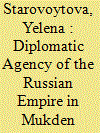

|
|
|
|
|
| Summary/Abstract |
In the late 19th century, tsarist Russia stepped up its foreign policy activity considerably in the Far East, particularly in China. One of the main regions of China within the Russian Empire's sphere of interest was the so-called "Three Eastern Provinces" (Manchuria), where the Chinese Eastern Railway (CER) was laid and the Kwantung Oblast (Territory) of the Russian Empire was established. In 1900, Russian armed forces led by Admiral Ye.I. Alexeyev were forced to temporarily occupy all of Manchuria in order to suppress an uprising organized by followers of the anti-foreign Yihetuan movement, also known as the Boxer Rebellion. The occupied area included the city of Mukden, the capital at the time of Fengtian Province, one of the Three Eastern Provinces. The importance of Mukden as an administrative and business center and one of the largest railway stations on the CER made it necessary to have an official representative of the tsarist authorities in the city. As the Boxer Rebellion was suppressed, a growing number of diverse firms and commercial enterprises began to appear in the re-gion, and in this connection, foreign powers sought to expand their presence there.
|
|
|
|
|
|
|
|
|
|
|
|
|
|
|
|
| 5 |
ID:
135139
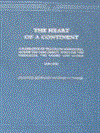

|
|
|
|
|
| Publication |
New Delhi, Asian educational services, 2007.
|
| Description |
xvii, 332p.Hbk
|
| Contents |
Old Publication
|
| Standard Number |
812060850X
|
|
|
|
|
|
|
|
|
|
|
|
Copies: C:1/I:0,R:0,Q:0
Circulation
| Accession# | Call# | Current Location | Status | Policy | Location |
| 058005 | 915.1/YOU 058005 | Main | On Shelf | General | |
|
|
|
|
| 6 |
ID:
044118
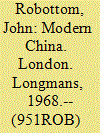

|
|
|
|
|
| Publication |
London, Longmans, 1968.
|
| Description |
172p.pbk
|
| Series |
Modern Times
|
|
|
|
|
|
|
|
|
|
|
|
Copies: C:1/I:0,R:0,Q:0
Circulation
| Accession# | Call# | Current Location | Status | Policy | Location |
| 004362 | 951/ROB 004362 | Main | On Shelf | General | |
|
|
|
|
| 7 |
ID:
082959


|
|
|
|
|
| Publication |
Peking, People's Republic of China, 1954.
|
| Description |
238p.pbk
|
|
|
|
|
|
|
|
|
|
|
|
Copies: C:1/I:0,R:0,Q:0
Circulation
| Accession# | Call# | Current Location | Status | Policy | Location |
| 053672 | 951.9042/WIN 053672 | Main | On Shelf | General | |
|
|
|
|
| 8 |
ID:
099580
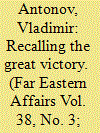

|
|
|
|
|
| Publication |
2010.
|
| Summary/Abstract |
This article written by a veteran Russian scholar of China and a veteran of World War II is devoted to his reminiscences about how this tragic page of our common history influenced his life and choice of profession
|
|
|
|
|
|
|
|
|
|
|
|
|
|
|
|
| 9 |
ID:
025700
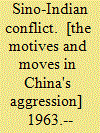

|
|
|
|
|
| Publication |
1963.
|
| Description |
48p.: maps
|
|
|
|
|
|
|
|
|
|
|
|
Copies: C:1/I:0,R:0,Q:0
Circulation
| Accession# | Call# | Current Location | Status | Policy | Location |
| 014140 | 954.042/SIN 014140 | Main | On Shelf | General | |
|
|
|
|
| 10 |
ID:
188510
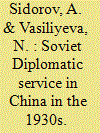

|
|
|
|
|
| Summary/Abstract |
AS THE WORLD was moving toward World War II, Soviet leaders and the People's Commissariat for Foreign Affairs (NKID) were paying as much attention to China as to the situation in Europe. By the early 1930s, Moscow no longer had diplomatic relations with China (they had been severed by the Chiang Kai-shek government in 1927, when the Kuomintang dissolved the [first] united front with the Communist Party of China). In 1929, in the wake of armed conflict over the Chinese Eastern Railway (CER), the Soviet Union closed its consulates in Manchuria (they reopened in 1930 after the Khabarovsk Protocol was signed that ended the conflict). Soviet consulates continued functioning in Xinjiang, which at that time was not controlled by the central Chinese government. A Soviet Embassy and five consulates functioned in the Mongolian People's Republic, which Moscow treated as an independent state while formally recognizing Chinese sovereignty over it.
|
|
|
|
|
|
|
|
|
|
|
|
|
|
|
|
| 11 |
ID:
095525
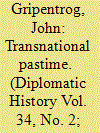

|
|
|
|
|
| Publication |
2010.
|
| Summary/Abstract |
On September 18, 1931, Japanese troops bombed a section of the Japanese-operated South Manchurian Railway outside the city of Mukden, blamed it on Chinese troops, and then used the manufactured incident as a pretext to conquer all of Manchuria.1 Within a year Japan formalized its territorial aggrandizement by "recognizing" the puppet state of Manchukuo. The Japanese advance in Manchuria was an epochal moment in world history, widely regarded as the first salvo of World War II. Historian David Kennedy asserts, for example, "On the wind-scoured plains of Manchuria, Japan . . . set the match . . . to the long fuse that would detonate the attack on Pearl Harbor just ten years later." Japanese scholar Saburo Ienaga similarly states, "The Pacific War began with the invasion of China in 1931," adding that events at the time "are inseparable, all part of the same war." Walter LaFeber meanwhile writes in his survey of U.S.-Japan relations that "World War II's roots ran back to September 1931, when the Kwantung Army struck to place all Manchuria under Japanese control."2 In logical accordance with this interpretation, some historians claim U.S.-Japan relations soured irreconcilably in the aftermath of Japanese aggression. "From this time on," writes Paul Schroeder, "the United States was to grow steadily more suspicious and hostile, until she finally stood militantly opposed to Japan's aggressive expansion." Another scholar adds that Japan's popularity among the American public "declined rapidly" following events in Manchuria.
|
|
|
|
|
|
|
|
|
|
|
|
|
|
|
|
| 12 |
ID:
158155
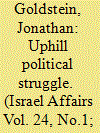

|
|
|
|
|
| Summary/Abstract |
Russian-Jewish army officer Joseph Trumpeldor (1880–1920) was arguably the most celebrated Jewish military hero of the first half of the twentieth century. He lost his left arm during the Russo-Japanese War of 1904–1905 and endured a year-long Japanese imprisonment. In 1905–1906, en route back to European Russia, Trumpeldor visited the Manchurian city of Harbin and attempted to impart Zionism to the local Russian-Jewish population, albeit with very limited success. Trumpeldor’s personal commitment to Zionism received its fullest expression in 1912 when he emigrated to Kibbutz Degania in Ottoman Palestine and subsequently died in defence of the Tel Hai farming community. His career inspired the Zionist movement named after him, Brit Trumpeldor. Abbreviated BETAR, it influenced leaders of the Jewish exodus from China in 1948–1949 and energised the Herut/Likud parties in Israel. Viewing Trumpeldor as only partially successful in his political efforts in Japan and Manchuria may somewhat tarnish the myth of the one-armed soldier and pioneering farmer. The inclusion of the Japanese and Manchurian dimensions of Trumpeldor’s uphill political struggle situates this hero within a far more realistic, and less Eurocentric, context.
|
|
|
|
|
|
|
|
|
|
|
|
|
|
|
|
| 13 |
ID:
140064
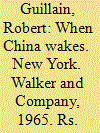

|
|
|
|
|
| Publication |
New York, Walker and Company, 1965.
|
| Description |
268p.hbk
|
|
|
|
|
|
|
|
|
|
|
|
Copies: C:1/I:0,R:0,Q:0
Circulation
| Accession# | Call# | Current Location | Status | Policy | Location |
| 000014 | 951/GUI 000014 | Main | On Shelf | General | |
|
|
|
|
|
|
|
|
|